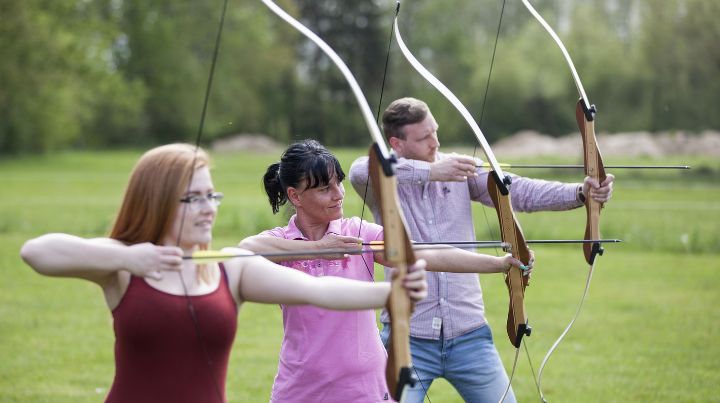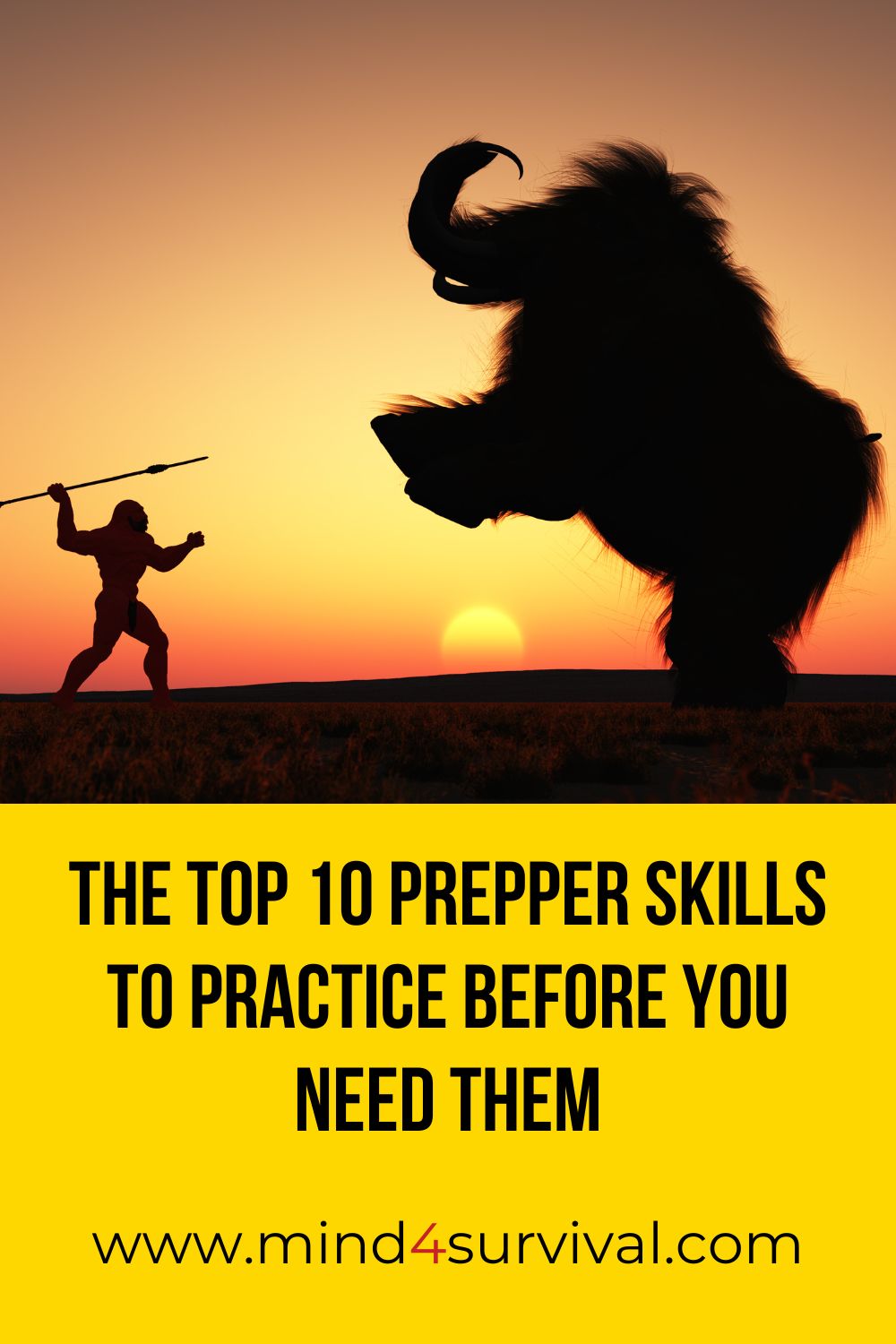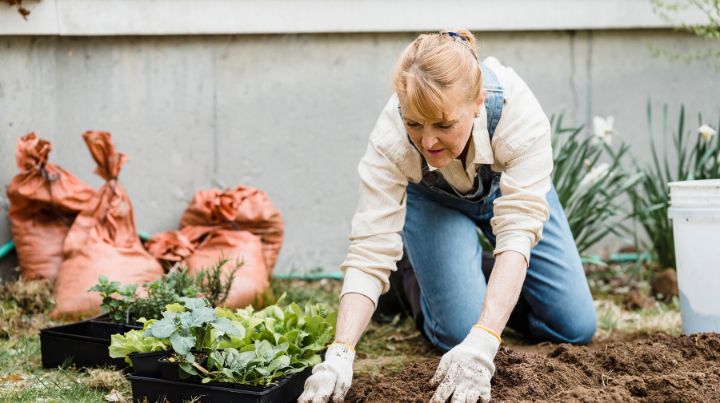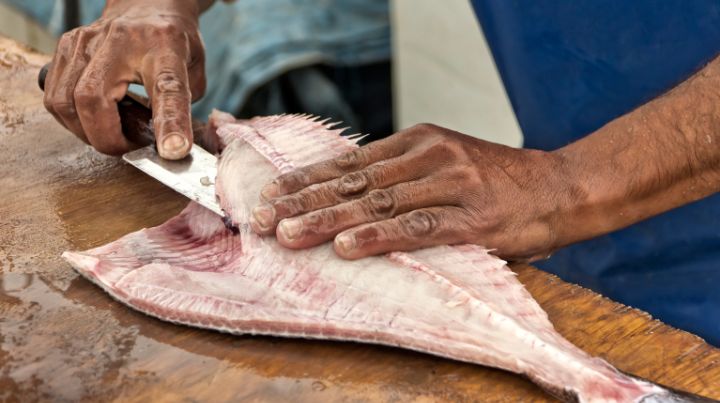The Top 10 Prepper Skills to PRACTICE Before You Need Them

Lots of people talk about the skills they plan to use when an emergency strikes. But what they don’t think about is that some skills are perishable and some require experience if you want to be truly competent. Today I want to talk about the top 10 prepper skills that should be practiced well before you need them.
These are all important and listed in no particular order.
The Top 10 Prepper Skills
1) Lighting a Fire
Lighting a fire sounds as easy as can be, and it is, given some practice and the right conditions. But, we all know that disasters don’t necessarily give us the right conditions. There’s no guarantee you’ll be lighting a fire in the comfort of your home in your fireplace or woodstove.
You might be lighting a fire with damp, unseasoned wood. You could be dealing with wind and rain. You need to learn multiple methods of starting a fire, know how to use fire-starting aids like the fat rope fire stick, and practice in less than ideal conditions. This is an essential entry in the list of top 10 prepper skills that a lot of people think will be easy until they try…and try….and try…and try. Get your failures out of the way now so that you have the confidence and skill to build a fire.
2) Gardening
How many people do you know who have a can of survival seeds and expect to live off the land when everything goes sideways? Do they garden every year or are they going to just “dig a hole” and pop a seed in the ground hoping for the best ala Bloomberg?
Farming is hard work and it takes experience. You have to learn the foibles of your area before planning to rely on a garden. What is your climate like? How long is your growing season? When are the first and last frosts? What grows well where you live and what needs more TLC? Which garden pests are most common in your area?
Take it from someone who has had an equal number of garden successes and failures, it takes practice to reliably grow food, and even then, Mother Nature can throw a monkey wrench in the plans.

3) Using a Weapon
Everyone has their favorite weapon, whether it’s a pistol, a rifle, a bow and arrow, a knife, or an ax. The list is truly endless. The thing is, the use of any of these weapons is a perishable skill. If you don’t practice with it, you may not use it safely or be accurate when it matters the most.
Whatever your weapon of choice is, practice using it in ideal conditions, then less than ideal conditions. Practice with your secondary weapon, as well. (And if you don’t have a secondary weapon? You’d better get on it!)
4) Tool Sharpening
Any edged tool will eventually require some maintenance in the form of sharpening it. Did you know that more people are cut with dull knives than sharp ones? According to the University of Rochester Medical Center:
A dull blade is actually more dangerous to use than one that is sharp. Here’s why: A dull blade requires more pressure to cut, increasing the chance that the knife will slip with great force behind it. A sharp knife “bites” the surface more readily.
The same risk holds true for dull axes and hatchets, garden tools, or combat tools. Learn how to properly sharpen the knives and other tools you rely on and do it regularly to maintain the edge.
5) Food Acquisition
In the top 10 prepper skills, one of the most important is the acquisition of food. There are many different ways to acquire food, and the way you pick depends on where you live. Are you a city dweller or do you live in suburbia? Is your home in a rural area? What about your climate: is it four distinct seasons, the desert, or the tropics?
Hunting, snaring, fishing, and foraging are different in all of these different settings.
Don’t expect to just pick up a rifle and go bag a deer to see you through the winter even if you’re a fine shot. Hunting is totally different than plunking away at a stationary target. Not only do you have to make an accurate shot, but you’ll also need to field dress the animal.
Different environments offer different foods to forage as well. Pick up a good regional guide and start learning about your local fauna now. Better still, take a class from a local expert. Foraging when you don’t know what you’re doing can be dangerous.
6) Food Preservation
So…you’ve successfully grown a garden or bagged some wild game. Now what? You still have the rest of the year to get through and you’ll have to eat then, too. That’s where food preservation comes into play. Learn to preserve food while the grid is working, then take your efforts off-grid and practice that. A power outage is no time to learn to pressure can on an outdoor propane cooker.
Some food preservation methods to look into are canning, dehydrating, freeze-drying, smoking, salting, pickling, and fermenting. Food preservation can be dangerous if done incorrectly. The risk of botulism is far too high to just “figure it out” on the fly.
7) Tying Knots
Tying knots is an often overlooked art on lists of the top 10 prepper skills. But it’s incredibly important. Here are some reasons you might need to use a well-tied knot:
- Making a shelter
- Hanging a clothesline
- Bundling things together
- Improvising a rope
- Creating a lanyard
- For climbing up or down cordage in an emergency
Here’s a really thorough guide to knot-tying.
8) Purifying Water
According to the World Health Organization, waterborne illness is the number one cause of death on the planet. More than 3.4 million people die each year because of unsafe drinking water. And after a disaster, waterborne illness is even more likely due to contamination from livestock waste, human sewage, chemicals, and other contaminants. This can affect wells, lakes, rivers, streams, and municipal water supplies.
In Haiti, years after the 2010 earthquake decimated the island nation, the already poor infrastructure was badly damaged and people were dying of diseases like cholera.
Knowing how to purify your drinking water is definitely one of the top 10 prepper skills you should practice before you need it. If you got a waterborne illness now, you could go to the doctor or hospital. After an emergency, those things might not be options. Check out our guide to water purification here.
9) First Aid
Do you know how to handle traumatic injuries? Countless lives are saved by a person who knows what to do before the ambulance arrives. It only takes 2 minutes for someone to bleed out. Learning to stop bleeding, clear airways, and manage other life-threatening injuries could save the life of someone you love.
You should have a trauma kit (add link) and know how to use everything in it. Take as many classes as you can such as Stop the Bleed (they even offer FREE online training), Red Cross First Aid, Red Cross CPR, and wilderness medicine classes so you know what to do in the event of severe injuries. The last thing you want to do is stand there helplessly while someone dies a preventable death.
10) Caring for Sick or Injured People
Caring for sick or injured people is entirely different than performing First Aid. It’s the care you provide in the aftermath of the illness or injury.
One of the top 10 prepper skills is caring for sick and injured people because post-disaster, you may not have access to medical care. Learn to treat symptoms of common illnesses like nausea, diarrhea, and upper respiratory problems with over-the-counter or herbal remedies. You should also know the proper way to care for a wound to speed healing and reduce the risk of infection. An infection in an off-grid situation can easily become deadly.
As well, if any members of your family are prone to a specific type of illness, learn everything you can about managing the symptoms at home and stock up on what you need.
What Would You Add to This List of Top 10 Prepper Skills?
Did we leave anything off this list of important skills? Share the ones you think we should add in the comments and tell us why it’s so important.
Additional Resources:
- Best Freeze Dryer for Home Use & What to Know Guide! (2023)
- How to Use a Fire Starter – The Survival Guide (2023)
- What’s the Best Weapon for Prepper Home Defense?
- Calculating Your Daily Water Consumption Needs

Don't Miss Out!
Join the thousands of people who rely on Mind4Survival preparedness advice by subscribing to our FREE newsletter.
- Practical preparedness information
- Zero Spam
- < 0.25% of people unsubscribe




Join Mind4Survival!
Stay informed by joining the Mind4Survival! 100% Secure! 0% Spam!
Follow Us!
Affiliate Disclosure
Mind4Survival is a free, reader-supported information resource. If you make a purchase through our link, we may, at no cost to you, receive an affiliate commission.




Agreed! Every item listed is indeed a necessary skill set to be competent with BEFORE anything happens. With this list, odds are you’ll be using some of these on a somewhat regular basis depending on what you do for a living, how old you are, and what hobbies you are engaged in. Good reminders and great article. Thanks!
Improve your cooking skills. How many things can you make from scratch? Do you know how to make soups or a basic bread? The more you know about cooking, the more flexible you can be.